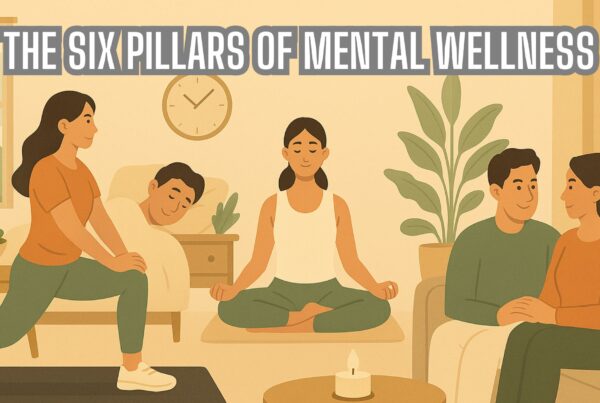Understanding and Managing Intrusive Thoughts: A Comprehensive Guide
In the quest for mental well-being, managing intrusive thoughts stands as a crucial challenge. These unwelcome visitors in our minds often bring with them a host of negative thinking, stress, anxiety, and self-doubt. They can strike unexpectedly, disrupting our peace and leading us down a path of constant worry and discomfort. However, understanding their nature and learning effective strategies to manage them can transform our approach to these mental intruders. This guide delves into the heart of managing intrusive thoughts, offering insights and techniques to help you navigate through the turbulence of negative thinking, alleviate stress and anxiety, and overcome the shadows of self-doubt.
Dealing with Unwanted Thoughts
Have you ever been startled by a sudden, unwanted thought that seems to come out of nowhere? These thoughts can be disturbing, sometimes violent or sexual, or they might involve fears of acting inappropriately. Known as intrusive thoughts, they are more common than you might think, affecting millions worldwide.
Intrusive thoughts can be particularly jarring because they often appear without any context, making you feel uneasy or ashamed. The more you try to dismiss these thoughts, the more persistent they become. It’s a cycle that many find hard to break.
The Nature of Intrusive Thoughts
Intrusive thoughts are not limited to those with mental health disorders. They can affect anyone, often triggered by stress or anxiety. Biological factors, such as hormonal changes, can also play a role. For instance, new mothers might notice an increase in these thoughts postpartum.
These thoughts are not indicative of hidden desires or intentions. They are simply the brain’s way of processing stress, anxiety, or changes in life. Understanding this can be the first step in managing them effectively.
Recognizing Intrusive Thoughts
How do you know if a thought is intrusive? There are a few signs. Firstly, these thoughts are usually at odds with your normal thinking patterns. They feel foreign and are often distressing. Secondly, they are repetitive and hard to control, creating a cycle of anxiety and worry.
The key to managing these thoughts lies in acceptance rather than resistance. Recognizing them as intrusive and not a reflection of your true self is crucial. This recognition is the first step in reducing their impact.
Strategies for Management
When intrusive thoughts arise, label them as such. Remind yourself that these are not your genuine thoughts or desires. Instead of fighting them, let them pass through your mind without judgment. This approach can lessen their power over you.
If these thoughts begin to interfere with your daily life, it might be time to seek professional help. Cognitive behavioral therapy (CBT) is particularly effective in altering thought patterns and managing intrusive thoughts. Remember, seeking help is a sign of strength, not weakness.
Living with Intrusive Thoughts
Living with intrusive thoughts can be challenging, but it’s important to remember that they are a common experience. They do not define you or your character. With the right strategies and, if necessary, professional help, you can learn to manage them effectively.
Remember, managing intrusive thoughts is a journey, not a destination. It’s about learning to live with them, understanding their nature, and not letting them control your life. With time and practice, you can find peace and maintain your mental well-being.
Release Hypnosis Melbourne Hypnotherapy
Since 2015, Lawrence Akers has been working under the name Release Hypnosis offering Hypnotherapy and ACT based work to the people of Melbourne or an online service. Based on St Kilda Rd, Release Hypnosis is an easy and convenient location to get to and accessible by the ANZAC station train and tram stop. Release Hypnosis can help with a wide range of presenting issues, and I offer a free 30 minute no obligation discovery call for those who are unsure if hypnotherapy is the right way forward for them.
Book Your FREE 30 Minute Consultation With Release Hypnosis NOW!
You may also like to read:
Discovering Purpose and Values: A Path to Mental Well-being
Can’t Visualise in Hypnosis? Here’s What You Can Do Instead.
Dealing with Financial Stress and Crisis: Finding Peace Amid Turbulence
What Is The Success Rate of Hypnosis?
Release Hypnosis Melbourne Hypnotherapy is accessible for people in: Abbotsford, Armadale, Albert Park, Balwyn, Bentleigh, Black Rock, Box Hill, Brighton, Brunswick, Bulleen, Bundoora, Camberwell, Canterbury, Carnegie, Caulfield, Chadstone, Cheltenham, Clayton, Coburg, Collingwood, Deer Park, Doncaster, Elsternwick, Eltham, Elwood, Epping, Essendon, Fairfield, Fitzroy, Footscray, Glen Iris, Glen Waverley, Glenhuntly, Greensborough, Hampton, Hawthorn, Heidelberg, Highet, Ivanhoe, Kew, Kooyong, Lalor, Laverton, Lower, Plenty, Macleod, Malvern, Middle Park, Moonee Ponds, Melbourne, Moorabbin, Mount Waverley, Murrumbeena, Northcote, Oakleigh, Ormond, Parkville, Pascoe Vale, Port Melbourne, Prahran, Preston, Richmond, Rosana, Sandringham, South Yarra, South Melbourne, Spotswood, St Albans, St Kilda, Surrey Hills, Templestowe, Thornbury, Toorak, Tullamarine, Williamstown, Yarraville, North Melbourne, Windsor, East Melbourne, Melbourne, Melbourne CBD, Melbourne 3004
Image by Gerd Altmann from Pixabay








